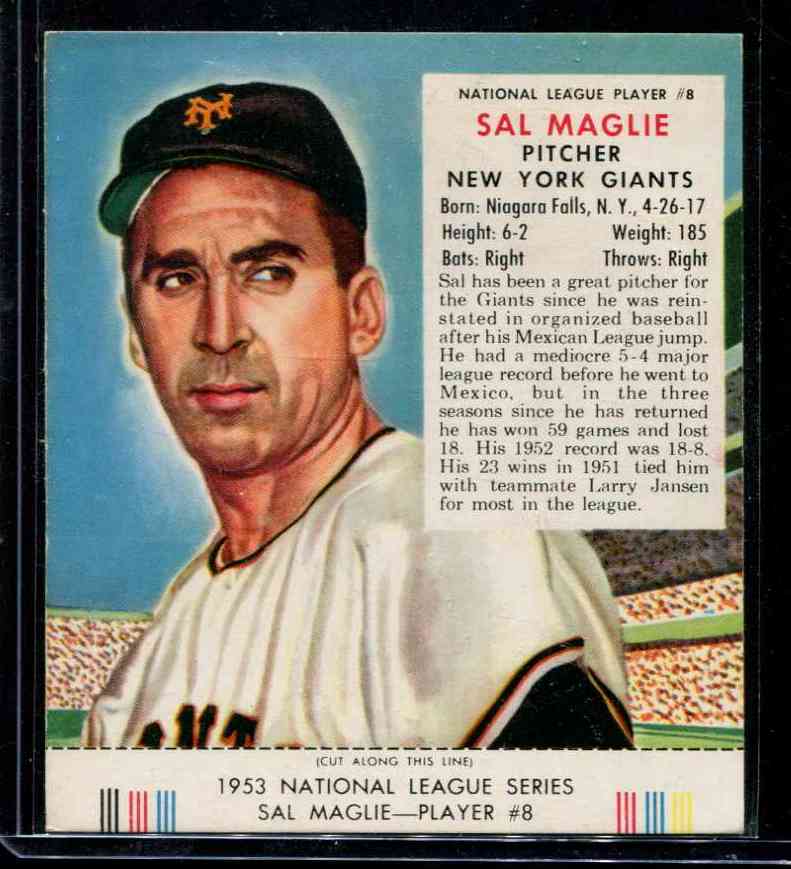Below are short bits & pieces on sportscard & baseball trading card collecting.
Please wander around the website for more info, prices, values & images
on vintage baseball, football, basketball, hockey, sport and non-sports cards.

1961 Topps Baseball Cards
Checklist & Values
The 1961 Topps baseball card set had 587 cards (#1-#598 with some missing numbers).
In addition to the missing cards, 2 cards were accidently numbered #463
(the Braves Team card was supposed to be card #426).
1961 Topps set was packed with special "subsets":
League Leaders (10 cards), World Series cards (10),
Highlights (11 cards), MVP's (16 cards), Checklists (7 cards plus several variations),
Team cards, Special Multi-Player cards, Managers,
Topps Rookie All-Star Trophies, & Sporting News All-Stars
Of note - 1961 Topps were the first cards bearing the very popular Topps Rookie All-Star Award Trophies.
"High Number" cards (#523-#589) are very scarce.
The least attractive aspect of the 1961 Topps baseball card set
were the capless players !!!
Baseball expansion led to the problem when
Los Angeles Angels were added,
the Washington Senators became the Minnesota Twins
and the Washington Senators got a new franchise.
Because of these changes, tons of players were capless
and looked awful. picture you 50 year old grand-dad.
Life was obviously tougher back then.
More 1961 Topps card info:
Card #1 was All-American basketball player Dick Groat
Card #2 was Roger Maris, right before his record breaking 61 Home Run season
Mickey Mantle was on (6) 1961 Topps cards adding to the sets cost.
Topps released 3 other sets in 1961: Topps Dice Game, Topps Magic Rub-Offs & Topps Stamps.
Click for complete
1961 Topps baseball cards Checklist and Prices
Note: You may be on that page right now.
Click for complete
1961 Topps Autographed baseball cards Checklist and Prices
|


1967 Topps WHO AM I ?
Checklist & Values
Easy to see why the 1967 Topps "Who Am I ?" set is a favorite of both sports
and non-sport collectors. 44 cards featuring history's important figures
PLUS (4) of baseball's top stars: Mickey Mantle,
Babe Ruth, Sandy Koufax & Willie Mays !!! Do you recognize them ?

 Player on front covered with scratch-off disguise with silly, hair,
moustaches, hats, noses... and a clue to help kids guess.
More clues on back. NO disguise coating then NOT MUCH VALUE.
Player on front covered with scratch-off disguise with silly, hair,
moustaches, hats, noses... and a clue to help kids guess.
More clues on back. NO disguise coating then NOT MUCH VALUE.
 Shakespear, Abe Lincoln, George Washington, Einstein,
Queen Elizabeth, Joan of Arc, Julius Caesar, Columbus, Jackie Kennedy
& more...
Shakespear, Abe Lincoln, George Washington, Einstein,
Queen Elizabeth, Joan of Arc, Julius Caesar, Columbus, Jackie Kennedy
& more...

1967 Topps Who Am I?
Checklist & Prices
You may be on page right now.
|

1985 Leaf Baseball
In 1985 Donruss created a special version of its baseball cards
(1985 Leaf) in an attempt to enter the Canadian baseball card market.
Except for the addition of a colorful green leaf, the card fronts
were virtually identical to Donruss cards. The most interesting
difference occurred on the back where the Leaf cards featured
text in both French and English !
At only 264 cards, the Leaf set was much smaller than Donruss with it's
660 cards. But ... because of it's smaller set size the Leaf
set has a much higher percentage of star cards. There was also
a special two-card "Canadian Greats" subset with paintings of Dave Stieb and
Tim Raines.
Top rookies are: Roger Clemens, Kirby Puckett, Orel Hershiser,
Dwight Gooden and Mark Lamgston.
|

Tobacco Cards
Starting approximately in 1886, sportscards, mostly baseball cards, were often
included with tobacco products, for promotional purposes and also because the
card reinforced the packaging and protected cigarettes from damage. These sports
cards are referred to as tobacco cards in the baseball card hobby. Over the next
few years many different companies produced baseball cards. Tobacco cards soon
started to disappear as the American Tobacco Company tried to develop a monopoly
by buying out other companies.
They were reintroduced in the 1900s, as American Tobacco came under pressure from
antitrust action and Turkish competition. The most famous and most expensive,
baseball card is the rare T206 Honus Wagner. The card exists in very limited
quantities compared to others of its type because Wagner forced the card to be
removed from printing. It is widely (and incorrectly) believed that Wagner did
so because he refused to promote tobacco, but the true explanation lies in a
dispute over compensation.
Soon other companies also began producing baseball and football cards. Sports magazines
such as The Sporting News were early entries to the market. Candy manufacturers
soon joined the fray and reflected a shift toward a younger target audience for cards.
Caramel companies were particularly active and baseball cards were one of the first
prizes to be included in Cracker Jacks. World War I soon suppressed baseball card
production.
© 1995-2019 "InterNet's Baseball Card Store" / Joseph Juhasz ... All Rights Reserved
|








